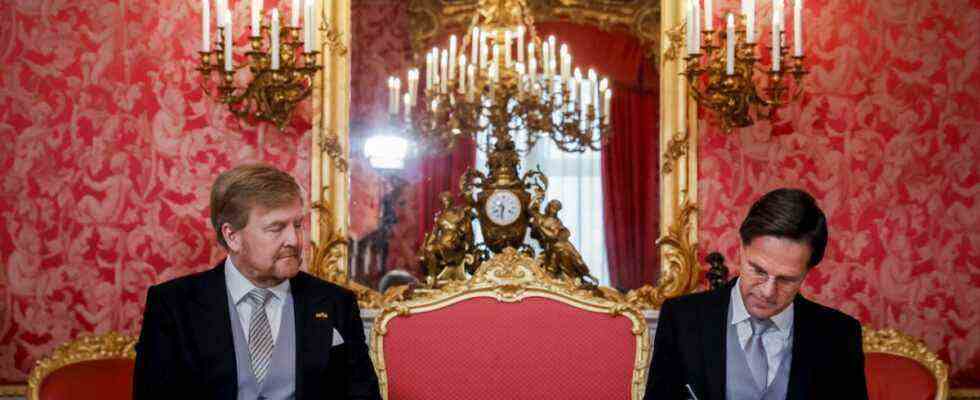The Netherlands has one government again, ten months after the election and almost a year after the previous one resigned due to a childcare grant scandal. On Monday morning, the old and new Prime Minister Mark Rutte (VVD) and his ministers took their oath of office in front of King Willem-Alexander in the Noordeinde Palace in The Hague. It is the fourth cabinet of the right-wing liberal, who has been head of government since 2010.
As before, he has concluded an alliance with left-wing liberals (D66), Christian Democrats (CDA) and the moderate Calvinist Christian Union. Rutte had clearly won the election in March, but afterwards denied, despite written evidence, that he wanted to get rid of a competitor in the coalition talks. The affair almost cost him his career, it did not initially look like a new edition of the coalition. At the end of the record-long explorations, the parties had no other option in terms of power politics.
The new cabinet is significantly larger than before; it consists of 20 ministers, nine state secretaries and, for the first time, half of women. Many are new to politics, such as the doctor and head of the Rotterdam University Hospital Ernst Kuipers, who replaces the rather hapless Hugo de Jonge as health minister. Only six remain from the previous ranks, among them the Deputy Prime Minister Wopke Hoekstra (CDA, previously Finance, now Foreign Office) and Sigrid Kaag (D66), who will receive the Ministry of Finance, which is also important in EU politics. While Hoekstra fought for an austerity course in the EU and tried to prevent the Corona reconstruction fund, Kaag stands for a more Europe-friendly and probably softer course towards heavily indebted countries.
Confidence in politics has been lost and ministers are threatened
Overall, according to the coalition agreement, politics is swinging slightly to the left, which is also due to Rutte’s weaker position. In addition, the alliance lacks a majority in the first chamber of parliament, which it can only find ad hoc with left-wing parties. The new government plans to invest a lot of money in combating the climate crisis. In addition, it wants to build 100,000 new apartments every year, significantly reduce the number of livestock, raise the minimum wage and make childcare largely free. In return, D66 accepts the construction of two new nuclear power plants and a longer operation of the still active kiln in Zeeland.
The main task of the cabinet, however, will be to calm the country down and regain the trust of the citizens that has been lost through scandals and failures. According to surveys, the coalition parties have clearly lost support since the elections. A quarter of the population no longer feels represented by the traditional parties. Some support far-right politicians like Thierry Baudet from the Forum for Democracy and its followers, who spread conspiracy theories about the coronavirus and defame the rulers as “tyrants” who should be “tracked down, persecuted and locked up”.
Such slogans fuel the corona protests in the country, which repeatedly degenerated into violence and clashes with the police. Politicians are regularly threatened. A forum trailer recently pulled a torch in front of Minister Kaag’s home. The police arrested him. The well-known activist had already threatened the Minister of Health personally.
The situation is exacerbated by the extensive lockdown that was enacted in December and is initially to remain in force until January 14th. According to critics, the violent measures are also a consequence of political errors in the pandemic. The government initially reacted too weakly. The Netherlands were late with mask requirements, vaccinations and boosters. In the local elections in March, the citizens will take stock of the new government.

